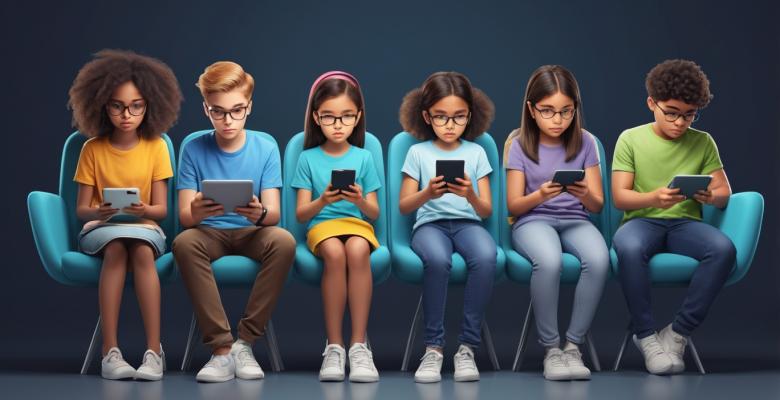THINKING AND THINKING: Less Screens for Your Child, Please
especiales

Videos of parents calming their small children (even toddlers) by giving them a cell phone or a tablet appear again and again on social networks... and some Internet users find it funny how children immediately calm down, interacting with the screen.
Is there anyone who can deal with a child's tantrum without losing his cool... but certainly the solution of always entertaining him with digital games and videos is becoming the easiest way.
And there are obvious risks.
Allowing children, regardless of their age, to spend a good part of their time connected to their mobile phones or tablets can have worrying consequences for their development.
It’s important that parents and the entire family are aware of these risks, so that they can take measures to ensure a certain balance in children's daily activities.
Overexposure to mobile devices impacts physical and emotional well-being. Spending hours in front of a bright screen can cause vision problems reported in medical literature. Eye fatigue or dry eye syndrome, for example.
At the same time, these sedentary activities contribute to a lifestyle that increases the risk of obesity and other associated disorders.
Physical exercise is essential during childhood. It strengthens the body, improves coordination, encourages the development of motor skills and contributes to emotional well-being.
Of course, the predisposition towards these activities varies depending on the character and the possibilities and circumstances of children. But the great playful potential can become a natural attraction.
Parents should introduce these options to their children from an early age.
Contrary to what some people think, constant interaction with screens can limit children's ability to concentrate, reduce their creativity and affect their school performance.
The information provided by a mobile phone cannot be assumed as a substitute for the work of a teacher, although it could be a useful tool. It’s necessary to establish hierarchies, specify methods, set routines.
Parents must stimulate the socialization of experiences, group exchange. The dependence on these devices can create isolation, preventing children from developing fundamental social skills: empathy, communication, ability to solve conflicts...
New technologies should not be demonized. The good thing would be to use them effectively and with common sense. Alternating activities should be the way.
Reading, for example, not only stimulates imagination and creativity, but also improves vocabulary, comprehension and promotes critical thinking.
The good thing is that digital media also encourage this experience. It would be good to show children that a tablet does not only allow them to play and watch videos.
But it’s also a good idea to leave the devices at home from time to time. Participating in outdoor activities allows children to explore the real world, interact with nature, develop an appreciation for the environment...
Artificial intelligence may be able to recreate a wonderful landscape, but it cannot replace many sensations.
Family time is also valuable. Sharing with loved ones not only strengthens emotional ties, reinforces empathy and communication, but can also provide a safe and friendly environment for children.
The list of activities is long, and some don’t require great effort: it would be good to rescue some board games... or simply insist on the wonders of telling stories in more or less improvised gatherings.
The role of parents is crucial. The much-discussed lack of time should not be an excuse. It’s necessary to manage the time children spend in front of mobiles at home or outside, based on clear and coherent limits for the use of technology.
It does not mean strictly prohibiting access (something that could even affect certain contemporary dynamics), but regulating it, while promoting other forms of entertainment and learning.
Establishing specific schedules for the use of devices, as well as encouraging the practice of sports, reading and creative activities can help children develop healthier routines.
Hopefully parents will lead by example, because children also learn by observing. If they see that their parents are not able to put their cell phones aside most of the time, they will assume that they can (or even should) do the same.
We insist, it’s not about ignoring the specific contributions of mobile devices in the comprehensive education of children, but rather promoting responsible and balanced use.
It’s clear that technology can be a significant source of information, education and entertainment, but it should not replace real experiences and authentic human relationships.
The ideal would be to create an environment where children can enjoy both spheres - the virtual and the real - without the first ending up replacing the second, or undermining the ability to dream.
Translated by Amilkal Labañino / CubaSí Translation Staff













Add new comment